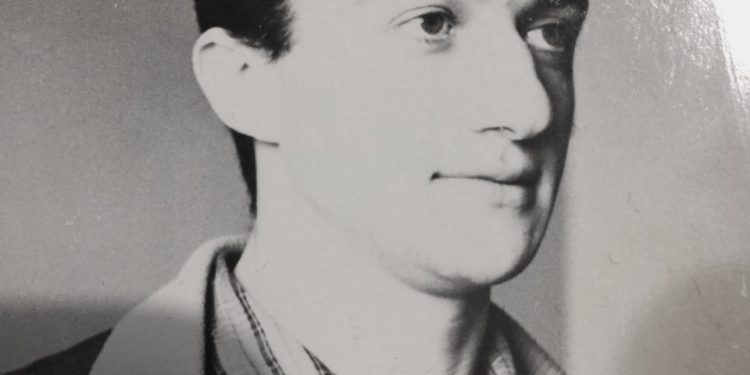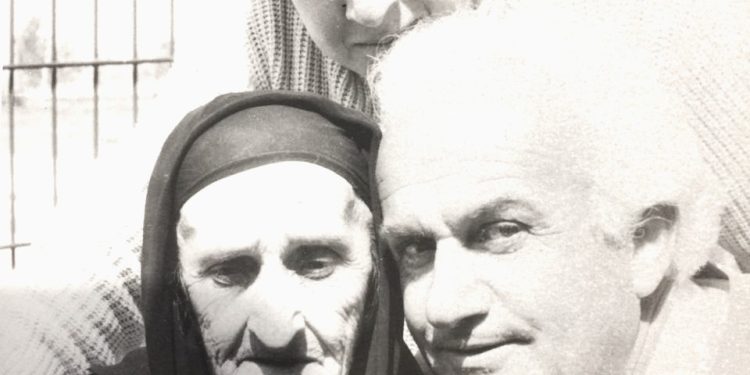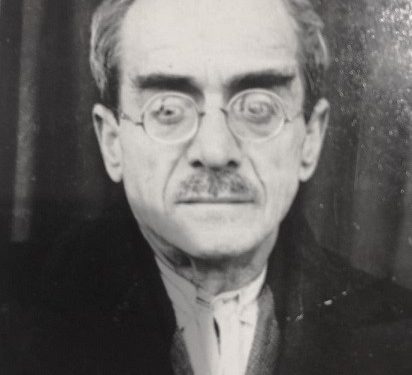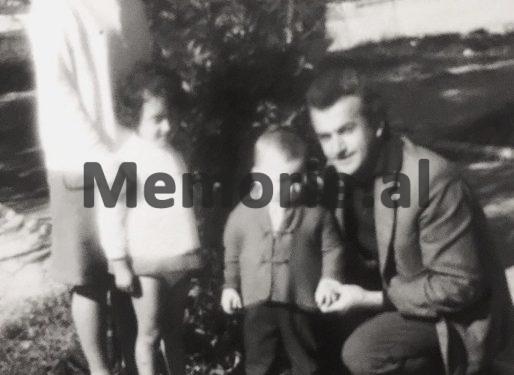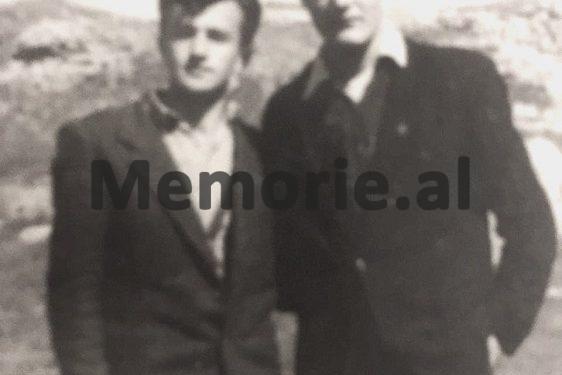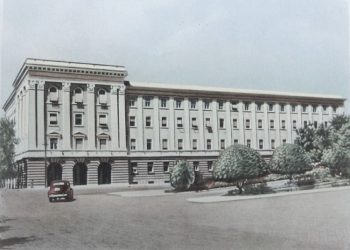From Sokrat Shyti
part nineteen
Memorie.al / The writer Sokrat Shyti is the “great unknown” who, for several years, has revealed the tip of the iceberg of his literary creativity. I say this based on the limited number of his published books in recent years, primarily the voluminous novel “Nata fantazmë” (Tirana 2014). His novels: “PËRTEJ MISTERIT”, “MES TUNDIMIT DHE VORBULLËS”, “GËRRYERJET E MAKTHIT”, “HIJA E TURPIT DHE E VDEKJES”, “KOLONELI KRYEDHJAK”, “SHPRESAT E NËMURA”, “PËSHTJELLIMET E FATIT” I, II, “MBIJETESA NË KASOLLEN E LOPËS”, as well as other works, all novels ranging from 350 to 550 pages, are in manuscript form waiting to be published. The dreams and initial excitement of the young novelist, returning from studies abroad full of energy and love for art and literature, were cut short early on by the brutal edge of communist dictatorship.
Who is Sokrat Shyti?
Having returned from studies at Moscow State University, right after the rupture of Albanian-Soviet relations in 1960, Sokrat Shyti worked at Radio “Diapazon” (which at that time was located on Kavaja Street), in an editorial office with his journalist friends – Vangjel Lezho and Fadil Kokomani – both later arrested and subsequently executed by the communist regime. Besides the radio, Sokrati, at the age of 21, if we may imagine, had passionate literary interests at that time. He wrote his first novel “Madam doktoresha” and was on the verge of publication, but… alas! Right after the arrest of his friends, to fill the cup, a brother of his, a painter, fled abroad.
Sokrat was arrested in September 1963, and in November of that year, he was sent into internment (together with his mother and younger sister) to a location between Ardenica and Kolonje in Lushnja. For 27 consecutive years, the family lived in a livestock shed made of reeds, without windows, while Sokrat was subjected to forced labor. During these 27 years, he was legally obligated to report three times a day to the regional authority. He had no right to move from the place of internment and was deprived of any kind of documentation, etc. In these conditions, among a livestock shed, he gave birth and raised his children. It was precisely from this event, or rather a very long history of persecution, that he was inspired to write the book “Survival in the Livestock Shed”!
Agron Tufa
Continued from the previous issue
EXCERPT FROM THE BOOK, “SURVIVAL IN THE COW SHED”
– “You, boy, have a special talent for deciphering enigmatic writings. If your brother hadn’t lost his mind and committed the criminal act of escaping across the border, and someone told us that the younger brother of the painter at the border has rare abilities as a decoder, you would be working in our sector today. But this film has burned. Now is the time for us to set all your manuscripts on fire!… You should thank us, especially me, for making this decision as an exception to the general rule, since it is known that manuscripts are archived to be used by investigators whenever someone’s name is mentioned. For you personally, the burning of these manuscripts might cause regret and pain.
After all, to write hundreds of pages, you have strained your brain and exhausted your energy. But in the situation, you find yourself, you must also accept the other side: with this action, we are freeing you from the gnawing anxiety that undoubtedly appears to anyone in their dreams from the fear of being trampled like a calf! After this burning, you will finally rest your mind, because the most dubious part of your documented work that you no longer need where you are going will disappear, as there you will be digging for your daily bread and you won’t have the chance to think about past writings.
With the burning of the manuscripts, along with the correspondence in Russian with that Indian, your student past comes to an end. Thus, this world is constructed: you wake up as a little pepper and end as an eggplant…!” – he emphasized quite pleased with a boastful grin, showcasing his cleverness, closing his lecture with a line from the “Epic of the National Front.”
After these words, he ordered his subordinate to dump the black bag over the cold tiles of the courtyard, relieved from the ordeal of having to read something indecipherable, considering he had to expend much effort and spend the entire night convincing the Head Investigator to approve the destruction by fire.
Conversely, if this had not happened and the chief insisted that the manuscripts of the Radio journalist be deciphered at all costs, then he would be in deep trouble. There were two paths: either he would go mad! Or he would be fired for incompetence. (For him, it mattered little what led the chief to accept this extraordinary decision, knowing full well that he didn’t put his subordinates in the archives, and certainly wouldn’t make an exception to the strict regulations!)
His instinct told him that he must have consulted someone of his rank, perhaps even the General Director of Radio Broadcasting, showing him some sheets of barely legible small writing. And the Director had likely influenced this decision after hearing good impressions about the talented boy whose successful path was interrupted by the madness of his irresponsible brother!)
At that moment, when the tongues of flames began to consume like a three-headed dragon the pages of manuscripts from the last three years, my soul fluttered and my heart ached! For it seemed to me as if the satanic fire was burning along with my creations and the enthusiastic predictions of my Indian friend that: “after a few years, you will become a distinguished writer!”
So, I asked myself: ‘how would my friend, Guno, react if he saw with his own eyes this inquisitorial farce in the sixth decade of the twentieth century, with what barbaric pleasure the red inquisitors condemn the dream of a young writer to burning and how happy they feel that they are banishing me into oblivion, stripping me of all civil rights’?
– “Well, this troublesome business is over!”… – said the chief inquisitor when the tongues of flame died down and the pile of manuscript pages turned into a mound of ash. – “Isn’t it strange that difficult resolutions in some cases are carried out with such ease that you feel frustrated we waste so much energy, as if we were trying to break a granite rock?”… – he added stretching out. – “We live in a strange world, where in just one minute, the work of several years turns to ash, a rather complicated matter, which if left unresolved, gnaws at one’s mind!”
– “Can you tell me when the decision will be made?” – I dared to ask, as if to say: “How cruel can you be?! Even now, as you gnaw at and consume parts of my soul like the vulture feasting on Prometheus’s liver, you are not satisfied?!” – “It’s pointless to waste your breath,” the inquisitor mocked. – Because only the top state bosses know the correct answer to this question. We are merely the servants of their orders. Meanwhile, your job is to keep your mouth shut and not meet anyone, as the colonel instructed you at Selvia. Officers of our rank monitor the implementation of every decision and order, reminding subordinates and the punished of their superiors’ instructions.
For example: I order you to tell your mother not to chatter with the neighbors. Otherwise, the burden of punishment will weigh heavily on her…! And in the meantime, I warn you: don’t make a circus of this!” – he threatened me in a harsh tone. – “I believe you understand where I’m coming from. You must always keep the colonel’s warning at ‘Selvia’ in mind: our shadows follow closely behind. You are not a child, not to realize that in every workplace there are our people, assigned special tasks, who bring us the latest information. You showed yourself to be quite naïve and foolish when you went to the Writers’ Union.
It seems you still don’t understand that from now on, you are no longer a citizen like the others? Let me tell you once and for all: all yesterday’s acquaintances, with whom you exchanged thoughts and shared coffee, will now avoid you. Not because they dislike or hate you, but class warfare prohibits them from maintaining previous relationships with you. So, you must engrave this in your mind from now on, you are labeled a ‘declassed’ individual!
As a journalist, you should know the meaning of this designation. Nonetheless, I’m not bothered to repeat it, because ultimately, it’s my duty. Remember this once and for all: the declassed are the most despised and contemptible category of our socialist society! But surely, we don’t lump them all together. Because some of them, generally speaking, are innocent, meaning they haven’t committed criminal acts against the state, like you.
However, the wheel of justice has turned against you. So, as such, you will automatically fall into the group of the despised, and you will bear the burdens and severe consequences of the family member, who lost their mind, and bore the terrifying mark that never disappears! Now that we have fully clarified, and the task of destroying the manuscripts is completed in your presence, I grant you permission and order to go straight home. This means: don’t be detouring along the way!”…
When I exited through the back door of the Ministry of the Interior, I felt completely devalued, stripped of all civil rights, empty, devoid of life’s essence, and as such, I would be left in complete oblivion in the future! Because even before the decision was made, the hardships of punishment began: I was stripped of the right to meet acquaintances, including my older brother, who works here right nearby, at the People’s Theatre, just ten steps from the imposing building of the Ministry of the Interior, to ask him how they acted towards him, and what they intend to do!
“Of course, they must have temporarily suspended him from work until a final decision is made. They have definitely changed the program, removing the announcements of weekly and monthly performances to ensure our last name does not appear,” – I thought to myself as I left the building of the People’s Theatre, trying not to draw attention from the actors, most of whom I knew closely, as they often came to the Radio Broadcasting for various roles in dramatizations, columns, and artistic broadcasts.
The three brothers Shyti were known throughout the artistic ensemble of the People’s Theatre since we belonged to the field of art and literature. Precisely for this reason, the sudden escape of the painter came with surprise and regret. Various speculations arose around the question: “what prompted and forced him to take such an irresponsible and dangerous action, knowing full well, in detail, the strict measures that are taken against family members?! Was he really that selfish and soulless?! How could remorse for acting against the people of his own household not have stopped him?!”
To avoid being noticed by familiar passersby (who are numerous due to the nature of a journalist’s profession), I took side streets and alleys, the only way to avoid encountering any colleagues from the Radio Broadcasting, who were certainly awaiting with curiosity the decision of the Government Commission on Internment-Expulsions, regarding where we would be exiled and for how long?!
Before dawn on October 5, 1961, loud knocks were heard at the door of our apartment, and my frightened mother stood up, terrified to open it. She hesitated to ask why this commotion at such an early hour, but the threatening order caught in her throat:
– “In five minutes, gather your things, the ones you have stashed away, the purchased food, go to the bathroom, as you will be traveling a long way!”
Immediately after this order, three tall boys arrived, seizing our belongings and furniture in haste, racing down the stairs toward the “Ifa” truck waiting at the entrance. There was a quiet and deep silence. The neighbors had been instructed by the Front leader not to come out to greet the internees and not to turn on the electric lights in their apartments, as this action is seen by state organs as a sign of solidarity with the declassed or as a silent protest against the Government’s decision!
“If anyone dares to break this strict order, there will be terrible punitive consequences: at the very least, dismissal from work and expulsion from the Party,” declared the Front leader.
My sister and I climbed into the truck bed, while my mother took a seat in the driver’s cabin, who would also serve as our escort.
– “The area operative and the plenipotentiary are waiting for you there,” – I heard the operations leader’s voice giving the final instructions to the escorting driver. – “The accompanying documents have arrived in due time at the Internal Department of the district. Your task ends when you deliver the internees to the designated location. Strict order: do not stop for a second along the way, even if urgent requests arise for personal needs. You must keep in mind: regardless of the secrecy surrounding this removal, surprises can happen. Therefore, remain on revolutionary alert!”
– “As you command, comrade chief! I am skilled in such journeys. As soon as I arrive at the designated location, I will inform you via radio.”
– “Set off!” – ordered the leader.
The engine of the “Ifa” rumbled from the belly of the truck, emitting a plume of smoke as it rolled onto the main road. My sister and I wrapped ourselves in blankets and lay on the mattresses to protect ourselves from the biting cold of October. We were heading toward Golgotha: a hellish life awaited us, one we neither knew nor could ever imagine!
Morning light fell on our faces as the truck passed the church on the hill of the village of Golem, a few kilometers from the city of Lushnje. An intensely anxious emotion seized me, one I had never experienced before: it was horrifying to pass through my birthplace, branded with the contemptuous label of being declassed, with no rights of citizenship in my own country! The internal voice of my wounded dignity whispered to me in a trembling tone that the city’s residents must have been alerted to the truck filled with internees passing through the main street, so everyone must have pressed their faces against the windowpanes with sorrowful gazes, unable to fathom if this terrible fate had truly befallen one of the respected families of this city!
To avoid torturing myself with these feelings, I covered my head with the blanket so that the curious bystanders wouldn’t see us, although the passersby in the line for milk must have noticed our mother in the driver’s cabin and realized that our family was being deported with this truck. At the intersection, as we were leaving the city, I stretched my neck to see which direction the vehicle would take. When it turned right, I got the impression we were going to Savër. But the truck continued on at speed: it passed Pushimin e Shoferit, Lumthin, Rrapezën, and even Kolonjën. Then it turned down the slope of the Ardenica hills.
Suddenly it braked because an unfamiliar man (about two meters tall, with a prominent nose, dressed in the military jacket of an English uniform, and wearing rubber black boots over his pants) signaled the driver to stop. He showed the driver a document confirming that he was assigned as a guide and climbed aboard. Two minutes later, behind the bend, the truck left the pavement and entered a muddy village road. The engine began to roar from the strain of the incline, and with great difficulty, it passed through the section where it risked getting stuck (thanks to the second differential installed on military trucks, which travel on wartime roads and tow artillery pieces of various calibers). It only stopped when it reached a dry clearing.
– “What a cursed road…” – the driver cursed, spitting. – “If it had gone on any longer with this muddy incline, the truck could have broken down!… Thank goodness we made it without damage! Otherwise, I would have serious problems…” – he added with a sigh. – “Because when defects happen in these cases, the bosses don’t waste any time, but send you straight to military court, and from there, they throw you into a cell!” – he complained to the guide with the prominent nose.
A man of average height and a rugged face approached the truck, introducing himself as the area’s operative, showing the appropriate documents. The driver scrutinized the official testimony carefully. After taking a second glance at the stranger’s face to compare it with the photograph, he pulled out a large notebook and asked the operative to sign for the handover of the three internees, according to the – “With that, my duty ends…” – the escorting driver added with a sigh of relief. He was stunned when he saw the empty truck cabin, but especially bewildered by the unusual sight, as he still couldn’t understand what kind of place this was; it didn’t match with either an internment camp or a place of residence?! A powerful shudder ran through my entire body like an electric shock when I noticed the transformed face of my mother; she had aged terribly during the long journey, as if the gnawing and horror of these hours had rapidly worn away at her body!
This painful state became even more apparent against the black backdrop of her clothing, from her headscarf to her shoes! (Since I was 8 years old, my mother had been wearing dark clothes from head to toe after the death of my second brother, just when he was on the brink of youthful bloom! After that, other misfortunes followed us, just as painful: my second sister passed away during surgery! And at the end of my second year in high school, my father also left this world!)
Perhaps due to the weight of the horror, at this moment, her miserable appearance caused a choking sensation in my chest, and it felt as if I were experiencing the first symptoms of a heart attack. I don’t even know to whom I directed the question, or if it came out of me spontaneously from profound internal turmoil: why hadn’t the pain ceased for this suffering woman, who raised and nurtured a brood of children without complaint, who toiled alongside our father, our esteemed dad, assisting him in every possible way?!
And now, as if the incessant gnawing of her arduous life was not enough, the wanderings from one shelter to another (especially the torturous deaths of her favorite son, her star-like daughter, and her husband, who suffered from bronchial asthma at a young age), a terrifying and hellish storm unexpectedly appeared, one she would endure with her two children in communist hell for an indefinite time…!
Although I had often traveled to various villages in Albania to write reports on “the happy collective life in agricultural cooperatives,” I had never encountered such proximity to a cow shed. That’s why I was astounded and stunned when the dark-faced operative addressed me, saying:
– “This will be your residence from now on!”
The supposedly designated residence for us was nothing more than an extension of the cowshed or an adjoining room, separated by a “corridor” of rough beams, an open space with no door or window, with earth and no ceiling! Thus, our nearest neighbor was the cow of the shed’s owner, who wore rubber boots and an army uniform jacket, topped with an old Austro-Hungarian hat leftover from World War I!
“Without a doubt, this villager must be a trusted spy of the Internal Department of the district, assigned to report to the area’s operative, perhaps even directly to one of the high-ranking bosses,” – I thought to myself. – “Whoever first thought of this torturous and humiliating accommodation – whether someone in the ministry or some terrible malefactor here, driven by sheer malevolence – wanted us to live under the same roof as the cowshed, to have a permanent animal neighbor to make it clear how degraded we would become and how we would be treated!”
Even though the exterior and interior do not resemble the homes of the villagers, it would still be used as such, since our bosses decided to bring us here, thus deeming it suitable for a declassed family. After all, this punishment does not come from the state. Memorie.al
To be continued in the next issue
Copyright©“Memorie.al”
All rights to this material are exclusively and irrevocably owned by “Memorie.al”, in accordance with Law No. 35/2016 “On Author’s Rights and Related Rights”. It is strictly prohibited to copy, publish, distribute, or transfer this material without the authorization of “Memorie.al”; otherwise, any violator will be held liable under Article 179 of Law 35/2016.




